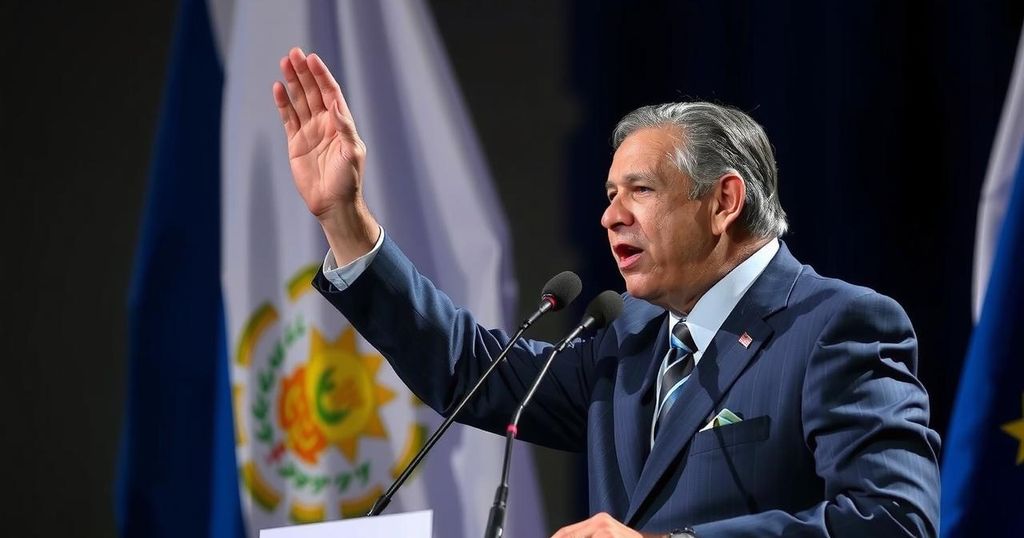Yamandú Orsi Wins Uruguay Presidency, Marking Return of the Broad Front

Yamandú Orsi has won the presidency of Uruguay in a tightly contested election, marking the return of the Broad Front party. With 49.8 percent of the vote against Álvaro Delgado’s 45.9 percent, Orsi vows to unite the nation amid significant social challenges. His victory follows a history of effective governance by the Broad Front, including poverty reduction and progressive reforms, while facing challenges like childhood poverty and organized crime.
In a remarkable election outcome, leftist candidate Yamandú Orsi has emerged victorious in the closely contested runoff for the presidency of Uruguay. His triumph marks the return of the Broad Front party, which previously governed from 2004 to 2019, after five years of center-right leadership under President Luis Lacalle Pou. Orsi, a former history teacher, won with approximately 49.8 percent of the votes, defeating Álvaro Delgado, who garnered about 45.9 percent.
The voter turnout was notably high, nearing 90 percent in the nation of 3.4 million, a reflection of Uruguay’s compulsory voting laws. In his concession speech, Delgado acknowledged the election’s outcome, noting the bittersweet nature of his loss and insisted that while his party did not win, they had not been defeated in spirit. President Lacalle Pou, who cannot run for reelection due to constitutional restrictions, extended his congratulations to Orsi and pledged support for a seamless transition.
Orsi, who will officially assume office on March 1, 2025, is focused on uniting the nation after a divisive electoral process. His victory is bolstered by the Broad Front’s history of governance, which included significant reductions in poverty rates and advances in progressive reforms, such as the legalization of abortion and same-sex marriage. He aims to continue this legacy with a platform emphasizing agricultural revitalization, tax incentives, and enhanced security.
Former President José “Pepe” Mujica, a significant figure in Uruguayan leftist politics, expressed his support for Orsi’s leadership, highlighting the importance of respecting democratic processes. Nonetheless, Orsi faces pressing challenges, including tackling childhood poverty which has escalated to 25 percent and addressing organized crime within the country. Analysts suggest that Delgado’s loss was due in part to his campaign’s failure to effectively communicate a vision for the future, instead focusing predominantly on criticizing the Broad Front.
As Orsi embarks on his presidential journey, he has called for national dialogue, aiming to include differing perspectives in the quest to strengthen Uruguay’s social fabric and economic resilience. As fireworks lit up the sky in celebration of his victory, Orsi acknowledged the diverse sentiments within the electorate, committing to fostering collaboration for a better future.
The recent election in Uruguay represents a significant political shift back to the left, specifically the Broad Front party, which previously held the presidency for 15 consecutive years. This election follows a period of center-right governance under President Luis Lacalle Pou. The election results reflect a broader global trend favoring opposition candidates, signaling a potential change in public sentiment towards traditional political parties. Furthermore, the Broad Front’s past achievements in poverty reduction and social reform provide a crucial context for understanding the implications of Orsi’s victory.
The election of Yamandú Orsi signifies a return to leftist governance in Uruguay, with the Broad Front looking to build on previous successes in social reform and poverty alleviation. Orsi’s commitment to national unity and pragmatic policies suggests a moderate approach that could appeal to a wide range of voters amidst significant challenges such as rising poverty and crime. The election’s outcome illustrates the shifting political landscape in Uruguay and reflects a growing preference for progressive governance in the region.
Original Source: www.newsweek.com








